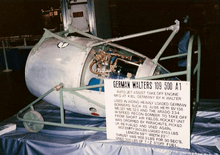Walter HWK 109-500
| HWK 109-500 | |
|---|---|
| | |
| HWK 109-500 on display at the Royal Air Force Museum Cosford | |
| Type | Liquid-propellant rocket (assist unit) |
| Manufacturer | Hellmuth Walter Kommanditgesellschaft |
| Number built | 6,000 |

The Walter HWK 109-500 was a liquid fuelled rocket motor developed by Walter in Germany during the Second World War.
The 109-500 is a self-contained. modular monopropellant Starthilfe (take-off assist) motor in a pod, able to produce 500 kg (1,100 lb) thrust for thirty seconds. After the fuel was expended, the pod was jettisoned and it returned to earth by parachute,[1] with the parachute packed externally, onto the blunt forward end of the pod.
The T-Stoff monopropellant, stored in the large spherical tank within the Starthilfe module's forward end, needed to react with a catalyst to provide the boosting thrust for an aircraft on takeoff - this Z-Stoff permanganate catalyst was provided in a small tank above the reaction chamber just forward of the exhaust nozzle, with compressed air from a network of five pressure tanks driving the monopropellant and catalyst together through the reaction chamber, which featured an internal, fixed helical "swirl baffle" to lengthen the period of time the monopropellant and catalyst were in contact for a more complete catalytic reaction within it, before the reacted T-Stoff exhaust exited the nozzle.[2]
It entered service in 1942, and some 6,000 were built, by Heinkel.[3] It was "used extensively on a wide range of aircraft", especially the potentially underpowered (when heavily laden with external ordnance) Jumo 004-engined Arado Ar 234B,[4] with two of the units uniquely displayed as mounted operationally on the NASM's sole surviving, restored Ar 234B.
Applications
See also
- Walter HWK 109-507 guided ordnance booster rocket module
- Related lists
Specifications
Data from Christopher, John. The Race for Hitler's X-Planes. The Mill, Gloucestershire: History Press, 2013.
General characteristics
- Type: liquid propellant rocket
- Length:
- Diameter:
- Dry weight: 125 kg (276 lb)
Components
- Compressor:
Performance
- Maximum thrust: 500 kg (1,100 lb)
- Power-to-weight ratio:
Notes
- ↑ Christopher, John. The Race for Hitler's X-Planes (The Mill, Gloucestershire: History Press, 2013), p.125.
- ↑ Illustration and text showing the 109-500 unit's internal details, with descriptive text on its operation
- ↑ Christopher, p.125.
- ↑ Christopher, p.125.
Sources
| Wikimedia Commons has media related to Walter HWK 109-500. |
- Christopher, John. The Race for Hitler's X-Planes. The Mill, Gloucestershire: History Press, 2013.
External links
- "Walterewrke.co.uk" page on the HWK 109-500 Starthilfe rocket motor
- Video of HWK 109-500 Starthilfe-boosted Blohm & Voss Bv 138 flying boat takeoff
